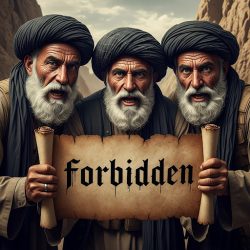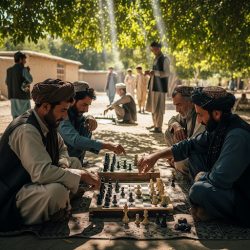Authoritarians Ban Chess
- by David Mehler
When the Taliban announced that chess was a forbidden activity in Afghanistan, it justified the prohibition by stating that the Game of Kings might serve as a platform for gambling. In Washington, DC, many years ago the police vice squad arrested chess players who were playing for stakes on Dupont Circle. The criminal cases were dismissed when the court ruled that chess is a game of skill and the outcome of each game is not based on chance, but on conditions wholly under the control of the participants.


For chess to be gambling, there needs to be at least one element of the activity that the people at risk of losing money do not control. However, placing bets on games that others are playing is gambling. It does not seem likely that the Taliban is concerned that people are betting on chess games played in Kabul tea rooms. There must be another factor to attract the interest of the authoritarian rulers of Afghanistan.
The explanation might be found in the history of other totalitarian governments that have banned chess. Those bans did not last long. Louis IX was the first absolute leader, as far as we know, to ban chess from the territory under his jurisdiction. His edict was honored in its breach, and whether it was formally withdrawn or just ignored is not clear. Similarly, Mao Zedong banned chess in 1966 as part of his effort to remove western thought from China. At the same time, he banned Einsteinian physics, and relativity was not acknowledged in the world’s most populated country. Mao’s ban on chess was enforced more effectively than was his ban on relativity, shown by China’s successful testing of nuclear weapons. When China decided to join the rest of the world, its new leaders promoted chess and its talented players became some of the best in the world.
Authoritarian leaders commonly discourage creative thought among their subjects. Chess teaches its players to engage in critical thinking, discerning the differences between good ideas and bad ones. Another common thread of authoritarian leaders is their desire to concentrate wealth in the hands of a small number of people, and to discourage their populations from rebelling against those who keep them impoverished. Chess teaches its players to create plans to improve their circumstances in a rules-based structure, so it is understandable that the Taliban would not want their subjects to learn the skills chess promotes.
